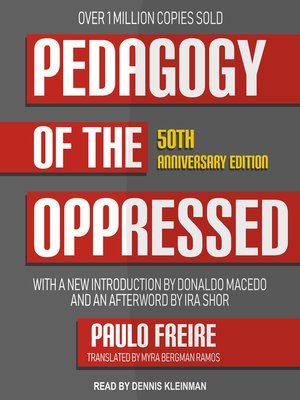

Problem-posing praxis provokes the question “why?” and therefore necessarily goes against the purposes of the oppressor. …banking theory and practice, as immobilizing and fixating forces, fail to acknowledge men and women as historical beings problem posing theory and practice take the people’s historicity as its starting point. The banking model inhibits creativity and severs people and their ways of being from the world, while problem-posing is based on creativity, reflection and action. Banking education mythicize reality and conceals certain facts, while problem posing seeks to demythologize reality. Any other way, Freire says would only further sustain dehumanization and oppression (75).īanking education resists dialogue where problem-posing necessitates it. Freire stresses the importance of humanist, revolutionary educators not using what Audre Lorde would call the Master’s Tools of the “banking” concept, but insists that revolutionary educators begin with problem-posing techniques so that they co-create knowledge with the people. This chapter details the inherent difference between “banking” and “problem-posing” education models and how they either work to oppress or liberate the masses. Propoganda, management, manipulation – all arms of domination – cannot be the instruments of their rehumanization.Ī humanizing pedagogy is one in which the teacher and the student (revolutionary leadershers and the oppressed) are both Subjects who are co-intent on collective reflection of reality as well as collective action in order to create new knowledge (69). The struggle begins with men’s recognition that they have been destroyed. On page 68, Freire explains why a humanizing pedagogy is required: This praxis can be summarized as “reflection and action upon the world in order to transform it” (51). Freire asserts that it is the oppressed that have the power to liberate themselves and their oppressors from an unjust social order through praxis (44, 51). Freire is clear that both those who exploit and those who are exploited are dehumanized in the process. In chapter one, Paulo Freire establishes the need for a pedogogy of the oppressed that differs from tradition pedagogies formed and implemented by those in power which serves as a tool of dehumanization and oppression.

This work blends theory and methods to emphasize the necessity for alternative pedagogies for and by groups of people that are oppressed by larger power systems.įriere’s main recommendation is that his pedagogy not be merely imitated and adopted as is, but that his practices be embraced and rewritten, recreated, and re-situated in different contexts. Purpose/Objective/Research Questions/Focus of Study:


 0 kommentar(er)
0 kommentar(er)
